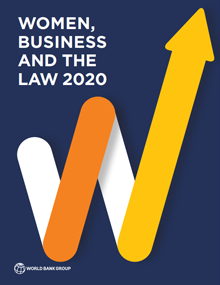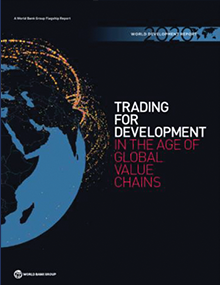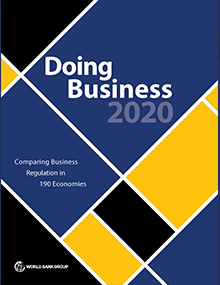Supporting robust human capital outcomes
Human capital is the health, knowledge, capabilities, skills, and resilience that people accumulate through life. It equips them to realize their full potential and become productive members of society and is a key driver of economic growth, poverty reduction, and shared prosperity. Countries that invest efficiently and equitably in building, protecting, and deploying human capital will be better prepared to compete in a global economy that rewards higher-level cognitive skills.
The COVID-19 pandemic places a spotlight on the importance of protecting human capital in times of crisis. Our policy note, Protecting People and Economies: Integrated Policy Responses to COVID-19, offers a series of recommendations, including: (i) combining measures such as testing and tracing, isolation and quarantine, and treatment to contain the disease and combat the pandemic; (ii) implementing efforts to preserve jobs, ensure more sustainable business growth and job creation, protect household income and food security, and ensure access to services for vulnerable populations; and (iii) working to maintain longer-term macroeconomic stability, build trust, communicate clearly, and rethink policy to build back with stronger systems for people and economies.
The profound impacts of the crisis underscore the urgency of achieving universal health coverage, establishing robust educational systems, expanding coverage of social protection, and ensuring adaptable programs and policies, so that countries can mitigate the effects of the shock and lay the groundwork for future resilience.
Implementing the Human Capital Project
The Human Capital Project is a global effort to accelerate more and better investments in people for greater equity and economic growth. As of the end of fiscal 2020, the project included 77 countries across regions and income levels—reflecting broad recognition of the importance of human capital as a key driver of economic growth, poverty reduction, and shared prosperity. The project is mobilizing partners to improve human capital outcomes, so that every girl and boy grows up well nourished and ready to learn, attains real learning in school, and enters the job market as a healthy, skilled, and productive adult.
The Bank Group is committed to helping countries improve human capital across its advisory, analytical, operational, and research services. As countries address the impacts of COVID-19, we are intensifying our support by mobilizing and deploying human resources, critical supplies, and financing toward public health interventions, nutrition, safety nets, and essential services as part of the emergency response, with special outreach to vulnerable groups, such as the elderly, health care workers, and those who have lost their livelihoods. We continue to help countries improve their human capital outcomes and accelerate progress by:
- Implementing a new generation of multisectoral development policy operations that focus on unlocking human capital gains by removing policy and institutional bottlenecks, including in Madagascar, Pakistan, Peru, and Rwanda.
- Sharpening the focus on learning poverty (the percentage of 10-year-olds who cannot read and understand a short text), and taking measures to address learning loss, especially amid school closures during the pandemic.
- Expanding universal health coverage—quality services for all without financial hardship, including for pandemics such as COVID-19—with an emphasis on primary care for an additional 1 billion people by 2023.
- Putting women and girls at the center of efforts through better access to education, health services, economic opportunities, and empowerment.
- Prioritizing foundational investments in children’s early years to boost the lifelong impacts of access to good health, adequate nutrition, early stimulation and learning, responsive caregiving, and safety and security.
- Accelerating investments to spur economic transformation, so that investments in human capital can translate into viable livelihoods and more and better jobs.
- Providing analytical support to help governments prioritize expenditures in the face of fiscal constraints and pursue a robust measurement agenda, including tracking key human capital investments and outcomes.
We are also preparing an updated Human Capital Index with the latest available data. These include 17 additional country profiles compared to the 2018 edition, greater disaggregation by gender, and a trajectory of human capital data for countries over a decade to better inform policy making.
Partnerships to foster collaboration and share knowledge are also central to the project. These include a Focal Point Network that connects government officials around the world to share their experiences, innovative solutions, and lessons learned, including from the fight against COVID-19. We also engage with the project’s global champions at major events, including the UN General Assembly and the World Bank-IMF Spring and Annual Meetings, as well as with other key stakeholders. To address the global learning crisis, we have mobilized partners, including UK Aid, the Bill & Melinda Gates Foundation, UNESCO, and UNICEF. We have also established the Human Capital Umbrella, a multidonor financing mechanism to support catalytic initiatives for accelerating human capital outcomes.
Responding to the global learning crisis
The world is witnessing a learning crisis. Even prior to COVID-19, nearly 260 million children and youth were out of school. Low-quality instruction meant many students were learning too little. The most disadvantaged children and youth had the worst access to schooling, the highest dropout rates, and the largest learning deficits.
At the UN General Assembly in September 2019, the Bank Group introduced a new concept, learning poverty, which we developed in close collaboration with the UNESCO Institute for Statistics. We found that the learning poverty rate in low- and middle-income countries was 53 percent, meaning that over half of all 10-year-old children could not read and understand a simple story. To galvanize action toward education goals and tackle this crisis, we launched a new global target at the 2019 Annual Meetings to reduce the learning poverty rate by at least half by 2030.
With operations in over 80 countries, the Bank is the largest external financier of education in developing countries. Through financing and analytical and advisory services, we help countries build and enhance systems that provide learning for children, youth, and those who need skills in adulthood. We currently finance over 145 education projects, ranging from early childhood development and basic and secondary education to skills development and tertiary education.
As we help address the impacts of COVID-19, our operational response seeks to mitigate the damage from the pandemic and use the investments made for remote learning during the crisis as a launchpad to accelerate progress toward a more resilient, equitable, and personalized education system. To support countries while schools are closed, we have moved quickly to help them set up or improve remote-learning systems, including through the effective use of print, radio, television, and mobile technology. We are also supporting nutrition for those who have lost access to school meals. To help countries manage continuity as schools reopen and to minimize student dropout, we are promoting learning recovery while ensuring that schools can operate safely through health protocols and better hygiene practices; campaigns to promote reenrollment and prevent dropouts based on early-warning systems; school feeding programs; blended in-person and remote learning through technology; and training to help teachers assess and remediate learning losses.
To improve and accelerate learning after reopening, we are helping countries build resilient education systems by ensuring that learning can happen anywhere; using data to make schools more equitable; providing personalized learning; and offering greater support for parents, teachers, and students, including socioemotional support.
We are working closely with a consortium of partners on these efforts, including UNICEF, UNESCO, the Harvard School of Education, and the OECD. Through project restructuring, additional financing, and new projects in nearly 60 countries, we have mobilized over $2.5 billion for education in response to COVID-19. Examples include:
- In Turkey, a $160 million emergency project to help the government develop digital content for television and online channels, as well as catch-up courses and blended teaching and learning programs. All TV-based materials will include sign language, subtitle support, and audio transcriptions for students with hearing or visual impairments. The project will also fund expansion of the current online education system, as well as mental health counseling.
- In Pakistan, a procurement plan to help the Ministry of Higher Education provide devices to all students so that they are able to participate in remote-learning opportunities.
- In Rwanda, an interactive instruction program that aims to reach 60 percent of all students, as well as a $10 million GPE-financed project to support remote learning through television, YouTube, and the government’s e-learning platform. When schools reopen, the project will support remedial, or catch-up, programs, including for students at risk of dropping out.
- In Nigeria, the restructuring of an existing project to provide 325,000 students with interactive radio lessons, digital self-study activity packets, storybooks, and mobile interactive quizzes, as well as support from teachers through classroom-based WhatsApp groups. It will also provide digital lesson guides for parents to support learning at home.
Ensuring accessible and quality health care
In March 2020, the Bank Group announced the COVID-19 Fast Track Facility to support countries’ response to the pandemic. This early response focused on addressing the immediate health needs of countries, including strengthening the capacity of health systems, limiting the spread of the pandemic, boosting disease surveillance, and supporting research to facilitate the development of vaccines and treatments. We are also helping countries access critically needed medical supplies by reaching out to suppliers on their behalf.
In fiscal 2020, we rapidly approved health operations to help more than 100 countries combat COVID-19. This is part of the Bank Group’s pledge to deploy up to $160 billion over 15 months through June 2021 to help countries address their health needs, as well as bolster economic recovery.
Our work is strengthened by our collaboration with key international partners. In February 2020, we joined forces with the WHO and other multilateral organizations on the COVID-19 strategic preparedness and response plan at the global and country levels. As the trustee for the Coalition for Epidemic Preparedness Innovations, we convened a multi-stakeholder task force to develop a vaccine for COVID-19 and help ensure fair global allocation of vaccines, once available.
Even before COVID-19, we had been helping developing countries strengthen their pandemic preparedness. Regional Disease Surveillance Systems Enhancement programs in 16 countries of West and Central Africa have been strengthening national and regional cross-sectoral capacity for collaborative disease surveillance and preparedness. Following the 2014–15 West Africa Ebola crisis, we helped establish the Africa Center for Disease Control and many national public health institutions. IDA has also provided $286 million in response to the 10th Ebola epidemic in the DRC, which began in August 2018. We also supported the East Africa Public Health Laboratory Networking Project, which created a network of 40 well-equipped public health laboratories with trained personnel and enhanced diagnostic and surveillance capacity in Burundi, Kenya, Rwanda, Tanzania, and Uganda; this network is now being leveraged for the COVID-19 response.
Our goal of achieving universal health coverage is crucial to building human capital. We help countries provide quality and affordable health services to everyone—regardless of their ability to pay—by strengthening primary health care systems, reducing the financial risk associated with ill health, and increasing equity.
Despite substantial progress in global health outcomes, the 2019 Universal Health Coverage Global Monitoring Report by the WHO and the Bank finds that significant challenges remain. It is estimated that each year, people in developing countries pay over half a trillion dollars out of pocket for health care, causing financial hardship for more than 925 million people and pushing nearly 90 million people into extreme poverty. We reaffirmed our commitment to accelerating progress in this area at the first UN High-Level Meeting on Universal Health Care in September 2019. As one of 12 co-signatories of the Global Action Plan for Healthy Lives and Well-being for All, the Bank Group will continue helping countries reduce inefficiencies and deliver on their international health commitments.
We help countries that face aging populations and a growing burden of non-communicable diseases. These diseases cause 70 percent of deaths globally, mostly in low- and middle-income countries. Primary health care services are critical for prevention, early detection, and management of diseases, as well as health promotion. To prevent, detect, and treat cancer, we are strengthening the capacity of health ministries in Burundi, Kenya, Rwanda, Tanzania, and Uganda through a regional program for cancer registries.
COVID-19 has caused significant disruptions in access to essential, life-saving health services for women and children, which threaten to roll back years of global progress in reducing maternal and child mortality. The Global Financing Facility (GFF), a country-driven partnership hosted by the Bank Group, provides catalytic financing and technical support to protect and promote safe and equitable health and nutrition services for women and children and build more resilient health systems. Working in 36 low- and lower-middle-income countries that have the world’s highest maternal and child mortality, the GFF is helping governments prioritize and plan for ongoing essential health services during the pandemic, strengthen frontline service delivery, and address constraints in delivery of sexual and reproductive health and other life-saving services. In Zambia, the government is now integrating essential health services for women and children and gender-based violence into its national COVID-19 response plan.
Before the pandemic, countries supported by the GFF were already seeing improvements in the health of women and children. In Liberia, between 2017 and 2019, the number of children under 1 year of age receiving immunization increased by 52 percent, and assisted deliveries rose by 48 percent. In Ethiopia, between 2016 and 2019, births attended by skilled health workers rose from 28 to 50 percent, and the number of children under 2 years of age receiving nutrition support rose from 27 to 44 percent.
This database is a global resource to track progress on key health sector indicators across countries at all income levels; the first dataset was published in 2000. The latest version, launched in 2019, includes data on health service coverage and health outcomes from 196 countries based on 1,204 surveys. It also includes data on financial protection for 149 countries based on 646 surveys, which look at the fraction of countries spending more than 10 percent of their total income on health care, as well as the percentage of the population who are impoverished by out-of-pocket health care expenses.
Protecting the poor and vulnerable through social protection
Social protection programs help protect lives and livelihoods, build and maintain human capital, and empower people to lift themselves and their families out of poverty, thus contributing to more just, equitable, and inclusive societies. However, the Bank’s Atlas of Social Protection Indicators of Resilience and Equity shows that only 45 percent of people around the world are covered by some form of social protection—in the poorest countries, only one in five poor people has access to social safety nets.
Effective social protection delivery systems are especially important in times of crisis, as they help people manage risks and cope with shocks. According to the Sourcebook on the Foundations of Social Protection Delivery System, well-developed delivery systems can allow for greater coordination across programs, ensuring that support goes to the right people and helping achieve maximum impact. In response to COVID-19, the Bank Group moved fast to leverage countries’ existing social protection systems to support families and businesses in restoring incomes and preserving their livelihoods. We are ramping up our investment in cash transfers by an estimated $10 billion over 15 months. We also helped countries enhance the preparedness of their social protection systems and build resilience against future crises.
In response to locust swarms affecting countries in Africa and the Middle East, our $500 million Emergency Locust Response Program is providing support to affected households through targeted social safety nets so that they can recover and rebuild. This includes cash transfers, cash for work, emergency food supplies, and seed and fodder packages that farmers can use to restore their crops and feed their livestock.
These crises underscore the importance of adaptive social protection systems, which can scale up quickly in times of crisis to reach those affected. Such programs also help build the resilience of poor and vulnerable households by boosting their capacity to prepare for, cope with, and adapt to shocks, including climate-related risks and fragile or conflict-affected situations. In India, the Pradhan Mantri Garib Kalyan Yojana Project will help scale up cash transfers and food benefits for 800 million people, provide robust social protection for essential workers involved in COVID-19 relief, and benefit vulnerable groups, particularly migrants and informal workers.
We are helping countries substantially increase coverage by 2030 by supporting safety net programs, including cash transfers, public works, and school feeding programs. A conditional cash transfer program in the Philippines is supporting more than 4 million households, accounting for a quarter of the country’s poverty reduction in the past seven years. In Kenya, the National Safety Net Program significantly expanded the coverage of cash transfers from 1.7 million people in 2013 to 5 million people in 2019, 2.3 million of whom were women.
Extending social protection to informal workers is a persistent challenge, with up to 80 percent of workers in developing countries earning their living in the informal economy and the number of workers who lack full protections also rising in high-income countries. Recognizing the changing nature of work, the Protecting All: Risk-Sharing for a Diverse and Diversifying World of Work report proposes an approach to worker protection and social security that is better adapted to the increasingly diverse and fluid world of work, calling on governments to provide social protection irrespective of the sector of work. Considering the devastating impacts of the COVID-19 pandemic on the poor, especially those in the informal economy, this proposed model of worker protection is more relevant than ever.


